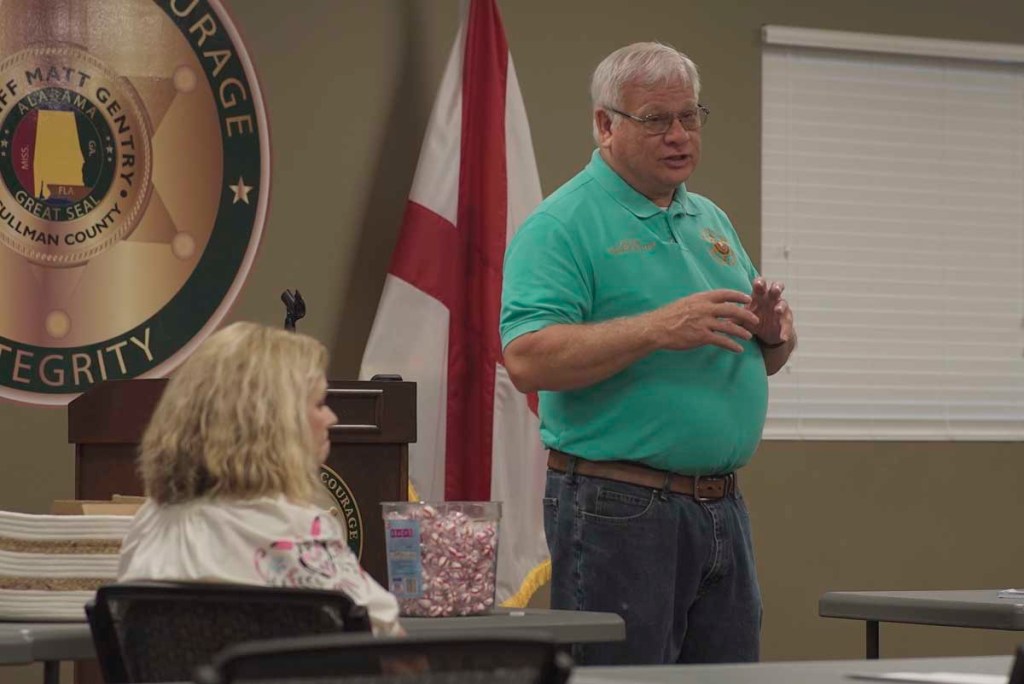New local non-profit seeks to find solutions for Alabama’s mental health crisis
Published 11:40 am Friday, September 27, 2024

- Mental Health Advocacy of Alabama board member Captain Edward Potter and director Rachel Turner during the group's kickoff meeting Thursday, Sept. 12.
A group of local mental health professionals have joined to form the Mental Health Advocacy of Alabama group, a newly established Cullman nonprofit, with the goal of providing a collective voice for the state’s mental health patients and the providers who care for them.
After nearly 20 years as a practicing oncologist and internal medicine provider, MHAA Director Rachel Turner said she decided to enter the mental health field after reflecting on her childhood experiences in custody of the Department of Human Resources.
Trending
“I don’t have many childhood memories, but those that I do have that of DHR are good memories. They took care of me and protected me. I feel like is what led me to have a passion to start my journey in mental health care,” Turner said.
Now, after having experienced the daily challenges mental health providers face — and the difficulty patients are presented with when seeking treatment — Turner is hoping to find solutions to fix what she believed is a deeply flawed system.
“We want to change how we assist mental health patients in our community. We want to advocate for those that are providing the care and their staff. We want to change the whole system because if you believe like I do, its broken,” Turner said.
Most recently Turner worked as the pediatric and adult administrator for Cullman Primary Care before its abrupt closing in November 2023. She described the experience of informing the patients who had become stable under the practices care that they would need to seek treatment elsewhere as one of the most difficult of her career.
Turner said she knew of at least four previously stable patients who have committed suicide since the practice closed last year.
“That’s what keeps me up at night laying in bed and worrying about these patients who were stable and in treatment and now there’s not enough providers and they’ve just been left out to dry,” Turner said.
Trending
Turner said one of the group’s initial goals was to create an easy-to-use directory for its members and to network to help patients find treatment options. She added the 20-plus attendees at the group’s kickoff meeting Thursday, Sept. 19, to the directory and said she plans on updating the list at least every six months.
MHAA board member and founding member Captain Edward Potter has more than 30 years of experience in law enforcement as well master’s degrees in psychology and human services. He is currently working toward obtaining his counseling degree.
In April, Potter previously called upon Cullman County’s local delegates to address what he felt were some of the most glaring issues contributing to Alabama’s mental health crisis in an Op-Ed submitted to The Times:
— The lack of beds in the state of Alabama for mentally ill patients.
— The second issue is that if the individual tests positive for drugs, they are released from the hospital with no help. Almost everyone in our society knows that people with mental illness self-medicate due to the lack of their ability to pay for the medication that they cannot afford, and they self-medicate with illegal drugs.
— The third issue is that many people who have mental illness help cannot be probated by family or friends due to having an active felony case in the court system. Many of these individuals have felony charges due to their mental illness.
— The fourth issue is that the people who oversee the probate commitments, have more training in the law on this topic and in mental health in general.
Potter is hoping the collective voice of the group will be able to gain lawmakers attention to find legislative solutions for these issues.
“It looks like one voice isn’t going to do it,” Potter said. “One person doesn’t have a voice but all of us together, I think, does.”
Turner said the group has already begun the process of applying for grant funding to start a co-pay assistance program for patients who would be otherwise unable to afford treatment. She hoped the group would also become a place where other issues individual providers are facing could be identified and a mechanism through which they could be solved.
“I know it seems like we have this huge mountain to climb but my mentality is that we just take it one step at a time,” Turner said.






